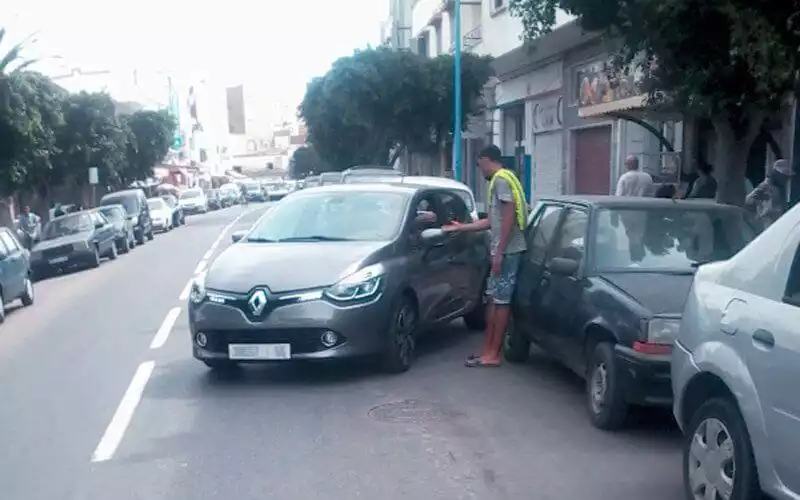Morocco’s Parking Mafia: ’Yellow Vests’ Extort Millions in Illegal Fees, Costing Cities Billions

In Morocco, the end of the dictatorship of the illegal parking attendants commonly called "yellow vests" is not for tomorrow. Motorists continue to pay illegal rates. A huge shortfall for the municipal councils.
Citizens continue to suffer the law of the "yellow vests". They pay daily fees ranging from 10 to 20 dirhams to park their vehicles in organized or anarchic parking lots, instead of the 5 dirhams set by the municipal councils. "Blackmail has become a daily rule, some attendants demand 10 dirhams or more for just a few minutes, and some even openly threaten: ’If you leave it without paying, you’ll find it scratched,’" says a sales representative in a pharmaceutical company to Al3omk. A nightmare for this man who stops at dozens of places every day during his visits to clinics and health centers in Casablanca.
According to a television investigation, the car guarding market generates a daily turnover exceeding 8 million dirhams, or more than 3 billion dirhams per year, circulating outside official channels and without any tax monitoring. The number of vehicles circulating in Morocco exceeds four million, whose owners pay between 2 and 5 dirhams daily, the investigation specifies. A simple calculation shows that if each vehicle owner paid only 2 dirhams per day, the volume of transactions would reach about 8 million dirhams per day, or 240 million dirhams per month, which is equivalent to 13% of the budget of the Ministry of Health for the year 2021.
According to Professor Jawad Elasri, a teacher of local finance at the University of Hassan II, the chaos surrounding the exploitation of municipal property has reached unacceptable levels. "Individuals organize themselves into gangs, sharing neighborhoods, roads and sidewalks without any legal basis, and under the eyes of the authorities," he observes. According to him, some people have even erected barriers, particularly in the vicinity of Kenitra, to prevent the passage of cars and motorcycles, in flagrant violation of the law.
"Where is the State? Where is the Ministry of the Interior? Where are the territorial authorities? Where is the Ministry of Finance? How can we allow parties to appropriate municipal property and collect fees without any intervention?" questions Elasri, insisting that these practices constitute a serious attack on the authority of the State, a blockage of the will of the legislator, and that they contribute to tax evasion and undermine the principle of tax justice. Municipal councils do not have the legal competence to rent out alleys and public roads, and cannot force citizens to pay fees for their use, a lawyer at the Rabat bar has specified.
According to his explanations, the basic principle for these spaces is free of charge, with the exception of parking lots set up for commercial purposes. The collection of fees by those known as "vest wearers" without a legal basis constitutes an act that can be assimilated to fraud, blackmail and fraud, the lawyer stressed, calling on victims to refer the matter to the public prosecutor’s office. According to the latter, only the legislator sets the rates. As for local authorities, they cannot impose new tariffs that increase the burden on drivers.
The site collected the testimony of a car attendant in Casablanca. He says he works under the orders of "invisible people" who control everything, and that he does not really benefit from the large sums collected. According to him, daily revenues sometimes reach 10,000 dirhams in certain strategic points, especially during the holidays, while his share does not exceed 300 to 500 dirhams. "The big profits do not come back to us, we work without any legal protection, without retirement or health coverage, and our future is becoming more and more precarious," he specified.
This witness calls for the organization and regulation of this sector. "Car attendants are not always the perpetrators, but often victims of an unjust system that forces them to work in the shadows," he concluded.
Related Articles
-

Rabat’s Urban Transport Revolution: 120 High-Tech Buses to Transform City Commutes
30 August 2025
-

Miracle at Sea: Moroccan Diver Survives 170km Drift, Rescued Off Spanish Coast
29 August 2025
-

Deadly Night Crash: 8 Killed as Truck Collides with Taxi on Moroccan Highway
29 August 2025
-

Global Crackdown: Moroccan Travelers Face Mounting Restrictions Amid Immigration Concerns
29 August 2025
-

EU Banking Reforms Threaten Billion-Dollar Remittances to Morocco, Sparking Financial Sector Shake-up
29 August 2025